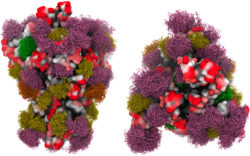COVID-19 cases have been rising again in the last few weeks, with the seven-day moving average of new cases rising to double digits for the first time since September. Public health experts predicted a rise in cases following Thanksgiving, as has been the pattern in recent years, and many experts are calling on the public to take precautions as the busy holiday season gets under way.
In Athens, Department of Public Health data has shown consistent increases in new cases in the last few weeks, with 141 new cases reported in the two weeks prior to Dec. 14. The seven-day running average increased to 11 for the week, up from 9.1 on Dec. 7. There have been a total of 30,146 confirmed COVID-19 cases in Athens since the pandemic began, according to DPH data.
Two Athens residents died of COVID-19 in the first week of December, according to DPH. To date, the virus has killed 236 Athenians. Hospitalizations also increased in the last two weeks, with 26 new hospitalizations in the first two weeks of December. To date, 1,651 Athens residents have been hospitalized with COVID.
‘We are seeing a steady increase in Covid cases and hospitalizations in all age groups, but especially those over the age of 65 years,” said Jayne Morgan, director of Piedmont Hospital System’s COVID-19 Task Force.
The DPH data is likely a vast undercount. According to recent wastewater data, viral levels have been rising in the weeks following Thanksgiving holiday and have remained elevated. While UGA students leaving Athens for the holiday break may provide some reprieve from rising viral levels, it is likely that they will resume rising once students return in January, as has been the pattern in the last two years.
“This week SARS‑CoV‑2 wastewater loads increased substantially, reaching the 88th %ile of all samples collected to date,” said Erin Lipp’s wastewater lab update on Dec. 16. “The rate of increase between last week and this week was also relatively steep; we have not seen a one week increase of this magnitude since August. Over the past two years, viral levels rose through December and early January; we are on track to repeat that trend. Although clinical cases are likely underreported due to at-home tests, reported cases increased again this week to 11 new cases per day (7-day moving average, as of 12/14).”
Athens’ current rate of new cases, based on previous winter surges, will likely continue to increase. This year, however, health experts are worried that high rates of RSV and the flu, alongside increased COVID-19 cases, may create stress for hospitals across the country. While RSV rates seem to be declining in most of the United States, levels of other respiratory illnesses such as influenza remain high.
“We’ve seen hospitals pushed to their maximums in the past few years of COVID-19,” public health expert Amber Schmidtke said in her newsletter earlier this month. “I have little doubt that COVID-19 will cause a winter spike in illness, but it won’t be alone this time.”
This year, flu rates are as high as they’ve been in nearly a decade. Many people also haven’t considered that their COVID-19 protection has decreased since their first vaccination. Without a booster dose, there’s limited protection against COVID-19. In Athens, the rate of new booster vaccinations has slowed to a crawl in recent weeks. While DPH data showed that 52%, or 65,774 residents, are fully vaccinated, that rate isn’t necessarily accurate because it’s been more than a year after many first doses were administered. As of Dec. 20, only 28% of Athenians have received a booster dose.
“Antibody levels have drastically dropped, as… initial vaccinations were more than a year ago,” said Morgan. “Currently, and because of that, we are recording more people hospitalized who technically meet the CDC definition of fully vaccinated, because that immunity is long since gone, and they have not received a booster. So in effect, they are back in the pool of the unvaccinated with regard to illness. It would be like getting a flu shot in 2020, and still thinking that that same shot is still protecting you as we head into 2023 without ever receiving a booster.”
Bivalent booster rates are around 10%, a very low rate, and those over 65 are still only about 35% boosted. With those numbers, infection rates are expected to climb. “The good news is that the current Omicron variants that are circulating appear to cause milder disease, however this could change and even these variants are dangerous for the elderly,” said Morgan.
People should be taking more precautions, say public health experts. Ultimately, this tri-demic could have a drastic impact on our hospitals if we don’t try and curb the spread of COVID-19 and other respiratory illnesses.
“The best thing we can do to stop the strain on hospitals is to avoid getting sick (i.e. get vaccinated, wear a mask, wash your hands frequently, improve indoor ventilation, etc.),” wrote Schmidtke, “and if we do get sick, try very hard not to spread it to others.”
Several more weeks of elevated viral spread in Athens and nationwide are likely. While rates have been low for a few months, many people have stopped testing regularly or if they are experiencing symptoms, but the public needs to start testing again so we can protect the most vulnerable.
“Don’t forget testing,” said Morgan. “The White House made free tests available to every household via their Winter COVID-19 Preparedness Plan just announced. The purpose is to make it easier for Amerians to access tools to prevent serious illness and hospitalization.”
Tests began shipping out the week of Dec. 19, and each household can order up to four at-home tests, regardless of how many tests they have ordered previously through the government program, and they will be mailed directly to homes for free. Visit COVIDtests.gov and get your tests.
Like what you just read? Support Flagpole by making a donation today. Every dollar you give helps fund our ongoing mission to provide Athens with quality, independent journalism.










